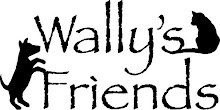Wally's Friends Director Eileen Price records her clinic's 20,000th procedure Monday, May 11.
The Humane Society of the United States estimates the annual intake of American shelters to be as many as eight million animals. Gentle reader, that is one per second of each fifty-hour working week. Half of that intake are euthanized every year. Yes, three to four million cats and dogs are euthanized every year in the US.
“This is society’s problem and multiple segments of society must work together for a solution,” said Dr. Philip A. Bushby of Mississippi State University’s College of Veterinary Medicine in his Keynote Address to PetSmart Charities 2007 Fix-it Forum. “We must stop the reproduction.”
Here in Chattanooga, Wally’s Friends [501(c)(3)] is working toward that goal and this morning, the low-cost, high-volume spay and neuter clinic performed its 20,000th procedure since opening in November of 2006. For Director Eileen Price, Drs. Winn and August and their seven assistants, there was no time for celebration. The daily pace of fifty-plus surgeries fills their lobby, holding cages, operating room and rings their telephone off the hook. Showing the iron discipline that served her well as ballerina in Canada’s Royal Winnipeg Ballet, Ms. Price answered my inquiries throughout her morning rush.
“I decided to devote the second half of my career to helping animals,” explains Price. “PetSmart encouraged development of these clinics in Georgia, Kentucky and Tennessee for the prevention of animal cruelty. That’s why I’m here. In New Hampshire, Peter Marsh worked really hard with local government support to spay and neuter. At 70% you really start to see a drop in the number of shelter drop-offs and strays euthanized.”
Our conversation temporarily suspended, I turned to speak with client Nancy Fullam, who had brought a cat to be spayed. She told me, “My [home] vet’s fee was $65 and this meant more driving and fighting traffic, but I like what they’re doing and wanted to support them. They do outreach. We live in north Georgia and they offer us services to bring animals up here.”
The interview with Price continued in the holding area, where she told me that while primary funding had come from PetSmart Charities, local foundations Benwood and the Community Foundation of Greater Chattanooga have also lent their support. A large window to the operating theatre showed Drs. Winn and August at work while a third animal recuperated from and a fourth was being prepared for surgery. Her mission is capital intensive. “All are on heart monitors. Animal temperatures drop under anesthesia, so our tables are heated and they recover on heated rice bags. State of the art protocols protect our reputation and earn the trust of the public.”
“But,” as Dr. Bushby noted, “animals are not the real problem, people are,” and he identified three groups of varying needs. First is financial. Wally’s Friends fee schedule is most reasonable and yes, they can work with those who are truly needy. Second is educational. It is this writer’s hope to propagate the Spay and Neuter ethic so that Bushby’s third prescription, “a kick in the pants”, will not be required.
As Ms. Price bid me farewell, one last question came to mind, “Who is Wally?” From their website: Wally was a German Short-Haired Pointer who was found abandoned, starving and seriously injured on the streets of Sacramento, California. Although suffering, her eyes still held a light of hope and kindness. Wally was rescued and lived a long full life of 17 years. She always welcomed any cat or dog her humans brought home to her, each one homeless as she once was.


.jpg)

No comments:
Post a Comment